New Hampshire Harm Reduction Coalition provides kits for safer drug use
|
Published: 05-11-2024 7:14 PM
Modified: 05-13-2024 11:44 AM |
Boxes filled with tourniquets, sterile water, bagged cotton and all the necessary supplies for safe drug administration are neatly arranged on the table within the office space of the New Hampshire Harm Reduction Coalition in Concord.
Every Thursday, volunteers like Katz Legier gather around the table, engaging in light conversation and sharing laughter, as they carefully assemble various kits aimed at minimizing the risks associated with drug use.
“It makes me extremely happy that this effort could possibly be the determining factor, whether someone avoids overdose or just disease,” Legier expressed, her hands deftly packing sterile water and alcohol pads into a plastic bag to create a safe injection kit. “With rising overdose deaths, I believe people should have access to care and be able to consume safely.”
Formed in 2017 in response to the lack of services in the state, the New Hampshire Harm Reduction Coalition seeks to bridge the gap by providing essential resources such as syringe services, programming, wound care and overdose prevention to individuals grappling with drug use.
Today, across the state, there are 15 syringe service programs and 9 Doorway programs, extending a helping hand to those in need of treatment, support, or resources for prevention and awareness.
But, Lauren McGinley, the coalition’s executive director said that there still needs to be more harm reduction services in the state. She advocates for harm reduction centers in every community.
According to McGinley, communities with harm reduction programs create safer and healthier environments, with individuals who use drugs five times more likely to access treatment or recovery programs compared to those in communities lacking such programs.
“We try to vocalize a lot that a nonfatal overdose is extremely dangerous as well,” she said. “I think good, better, best is a great way to explain why a strategy like harm reduction should be implemented in different communities.”
Article continues after...
Yesterday's Most Read Articles
Harm reduction involves direct engagement with drug users, fostering a non-judgmental environment, providing necessary supplies for safe drug administration and empowering individuals to reach their goals through gradual, incremental change. It is a set of practical methods to ensure individuals using drugs can safeguard themselves against additional risks, such as disease transmission, overdose and infections.
Despite being approved and vetted as a public health strategy by the Center for Disease Control and Prevention and the Substance Abuse and Mental Health Services Administration, harm reduction strategies are sometimes seen as promoting drug use.
Every day in her work, McGinley finds herself confronted with questions about whether harm reduction strategies simply enable drug use. However, she reframes this notion, seeing it as “enabling people to stay healthy and safe if using drugs.”
“We have to stop thinking of substance use as something that everyone can just stop doing,” stressed McGinley, pointing out the challenges in accessing treatment care, including financial and social barriers.
For volunteers like Leiger hoping to make at least 100 kits in a few hours, each moment spent packing supplies isn’t just about the physical task; it’s about making a difference.
The latest report from The NH Drug Monitoring Initiative reveals a 12% decrease in drug overdose deaths in New Hampshire from 2022 to 2023, dropping from 486 to 430, marking the first decline in four years. This positive trend is attributed to a 36% reduction in methamphetamine-related deaths, although there’s concern as cocaine-related deaths saw a 9% increase during the same period.
Despite this progress, fentanyl continues to be the primary contributor to overdose deaths, responsible for 362 fatalities in 2023, constituting 84% of the total. Additionally, in nearly all instances (469 out of 486 deaths), fentanyl was detected alongside other substances, underscoring its widespread presence in overdose cases.
Concord documented 15 overdose deaths in 2023, while Manchester reported the highest numbers with 92 confirmed fatalities. However, this toll could rise pending toxicology reports from the NH Medical Examiner’s Office.
In the packing area, a prominent board on the wall displays a list of various kits and their quantities that might be required at Concord and Manchester. This information is gathered from the feedback received by the coalition.
Care coordinators like Liz Beaule take the wheel to bring the coalition’s navy van adorned with vibrant poppies and lilac flowers on one side and a purple finch on the other to the community.
Packed within are vital supplies like harm reduction kits, syringes, naloxone (commonly known as Narcan), a range of contraceptives, wound care kits and emergency contraception, ready to provide support to individuals when needed.
Beaule, with four years of experience as a care coordinator on the van, views her role much like any other job – taking orders from customers as they come. However, the gratification she finds in her work sets it apart, making it uniquely rewarding.
“We get to watch wounds heal, we get to see people become less chaotic in their use, we get to see people form friendships,” said Beaule as she watched the volunteers put the kits together for the Concord exchange, where the van will be in the community from 9:30 a.m to 1 p.m.
The coalition operates a syringe exchange program, where participants receive an additional 10 sterile syringes for every 10 used ones they bring in.
This program aims to eliminate the presence of used syringes from streets and playgrounds, reducing public health risks.
“Our work is in evidence-based approaches and giving folks love and compassion and a nonjudgmental space to be and we’ve seen the evidence show itself over the four years that we’ve been doing it,” explained Beaule, who has now switched roles within the team.
The coalition uses a unique system for data collection, designed to prioritize participant anonymity and comfort. Each participant receives a randomized code card.
The card includes vital legal protection. It displays the state statute that shields individuals from prosecution if they are found in possession of syringes containing trace amounts of controlled substances.
When a participant approaches the van to receive supplies, they can either display the card with their unique code, verbally share the code or request a new one if they’ve forgotten.
Through these codes, the coalition gains valuable insights into participants’ engagement duration and their progression in drug use methods, such as transitioning from injection to snorting. This data analysis helps the coalition better understand the community’s needs and adapt their support accordingly, ensuring more effective assistance over time.
“There’s definitely missing pieces to it and there’s probably not like 100% accuracy in that, but we’re able to pull these really important stories out of it like participants are having positive changes after their outcomes of coming to the exchange and staying engaged,” explained Beaule.
Some people who’ve been engaging with the coalition’s services for years are recognized as familiar faces eagerly anticipating the van’s arrival, every week across the state.
The van not only offers services in Concord and Manchester but also extends its reach to Portsmouth, Dover, Somersworth and Rochester. Currently, the coalition is actively fundraising for a second overdose prevention van to broaden its impact and assist more individuals across the state.
According to the coalition, in 2023, participants accessing their mobile services program reported successfully reversing 860 drug overdoses across the state.
The state data shows that during the initial three months of this year, EMS administered Narcan 267 times. The numbers for Narcan administrations were 1,532 in 2023 and 1,717 in 2022.
Providing participants with supplies for drug use isn’t the sole focus when the coalition takes its van to the community. Care coordinators also frequently connect them with sought-after resources like housing, food, clothing, treatment and even mental health services.
Building trust with individuals attending the exchange events has been pivotal to the program’s success, according to coalition staff.
While drug misuse can contribute to mental health disorders, there are other concurrent factors, such as homelessness, that can exacerbate mental health issues.
“I don’t blame them for using drugs. Being out on the street is terrifying, dangerous, and traumatizing,” said Beaule. “Providing engagement tools like syringes is just one more way for individuals to trust us. From there, they gain confidence in themselves to pursue positive changes or whatever support they may need.”

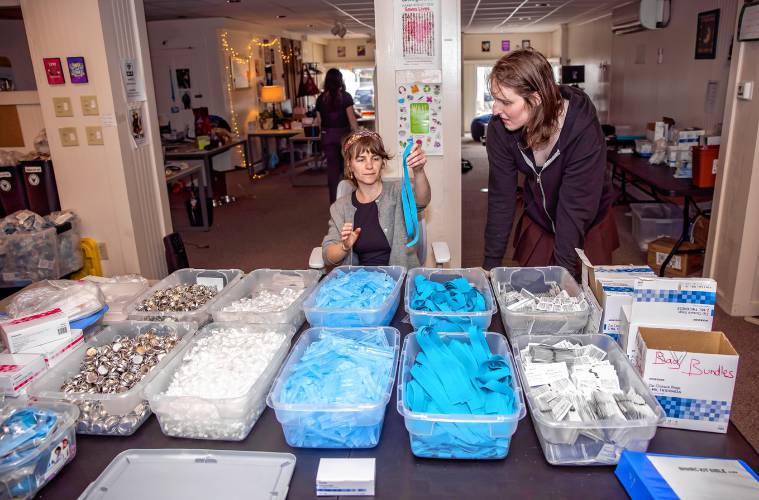
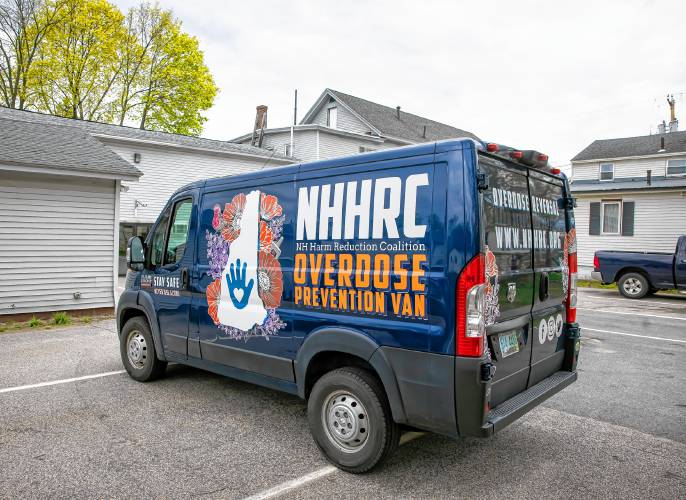
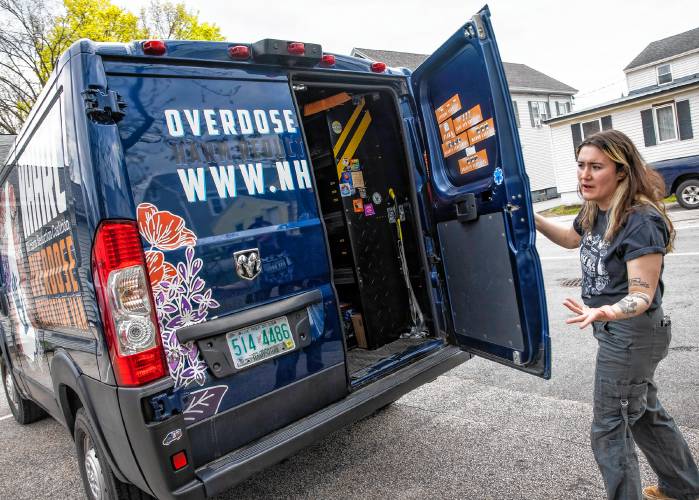
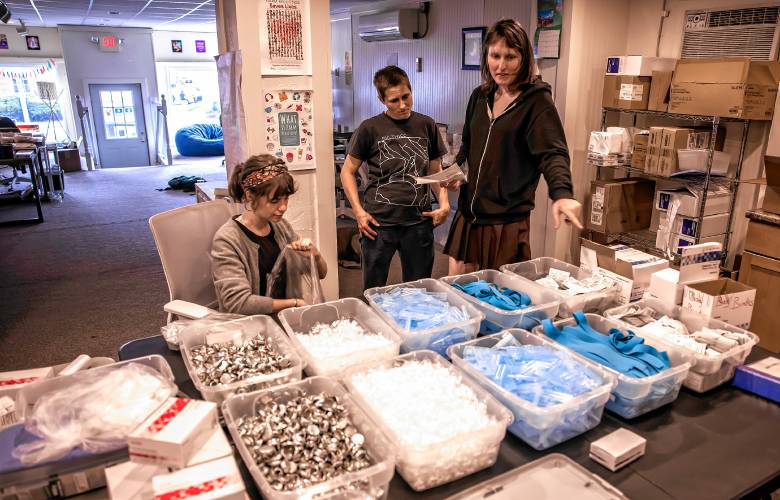
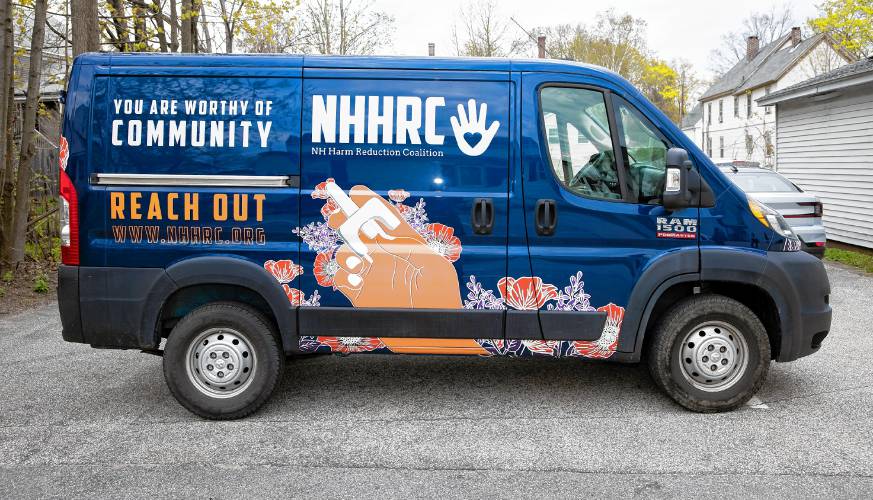
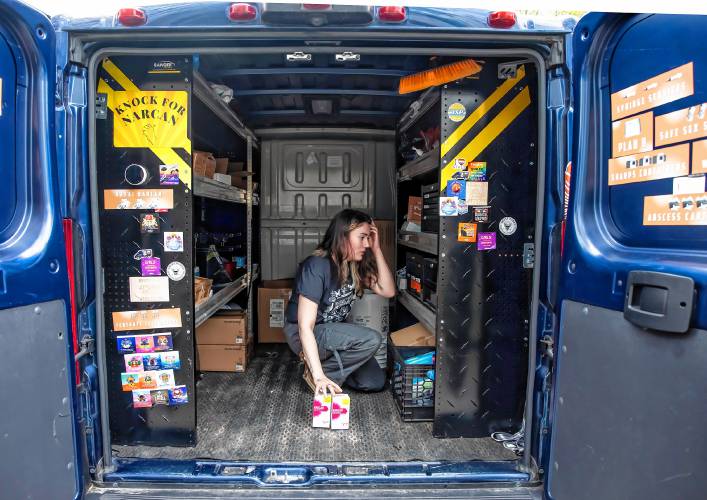
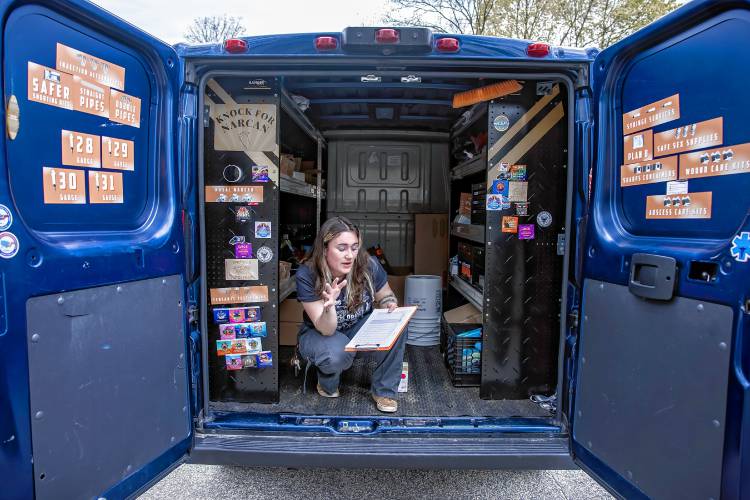






 A soggy spring continues
A soggy spring continues Fire at Bradford house kills four pets
Fire at Bradford house kills four pets Penacook parade to commemorate Memorial Day
Penacook parade to commemorate Memorial Day  ‘Friends of the Beav’ want people to see the city’s golf course differently
‘Friends of the Beav’ want people to see the city’s golf course differently 
